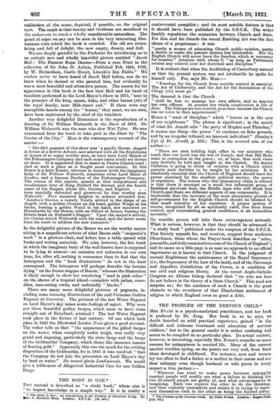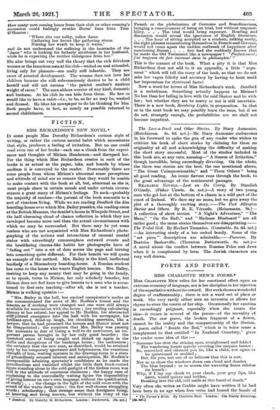THE PROBLEM OF ' riff NERVOUS CHILD.* MRS. EVANS is a
psycho-analytical practitioner, and her book is prefaced by Dr. Jung. Her book is, as he says, no doubt founded on solid practical experience, gained " in the difficult and toilsome treatment and education of nervous children," but to the general reader it is rather confusing and seems to be compiled on no particular plan. Its actual content, however, is interesting, especially Mrs. Evans's remarks on some reasons for unhappiness in married life. Many of the current marital troubles spring, as she points out very well, from fixed ideas developed in childhood. For instance, men and women try too often to find a father or a mother in their mates and are thus unhappy even though husband or wife prove in every respect a true partner :— " Whoever has tried to make peace between unhappily married people will readily see what a failure in thinking the two ill-mated-people are guilty of, and what extravagances in imagining. Each one expects the other to do the thinking, and then violently contradicts and resists it in trying to repre- sent themselves each to the other as being the injured party- • The Problem ojthe Nervous Child. By Elida Evans. London Kelianr.w• 1123. ad.] Om* mealy men-coming home from their club or other evening's recreation could feelingly . re-echo Burns' lines from Tam O'Shanter
' Where sits our sulky, sullen dame Gathering her brows' like gathering -stoma Nursing her wrath to keep it warm.' and do not understand the suffering- in the heartache- of the dame' who is looking for fatherly attributes in her hnsband, while he is expecting the mother indulgence from her."
She also brings out very well the theory that-the rich frivolous
woman or the luxurious man at his-club--waited on and attended) living - only for pleasure--are really still infantile.. They are cases of arrested development. The woman does not love -her children because she still-subconsciously desires to be a child hsaiielf Will not sestina " the patriot mother's anxious weight of caret:" The-man abhors worries. of any kind, domestic and-business. At his club he can hide-from them: He has or Weald like to have a valet—i.e., to be, as far as' may be; washed and dressed. He likes his newspaper to do his thinking for him. Such people have, in fact, as nearly as possible returned to
second-childishness.



































 Previous page
Previous page